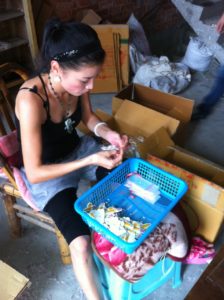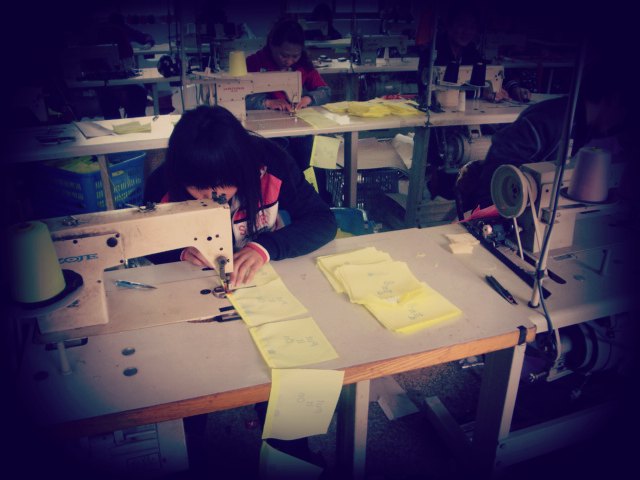When sourcing direct from China, avoid watering down your inquiry.
When you inquire for a price from a vendor and kickstart a project; you want to establish some sort of credibility with the company providing you the quote. You want to give them a reason to quote you. When you grab your inquiry or RFQ by the shoulders and pick the poor guy up and dunk him in a bucket of water over and over and then hand this sopping wet request to your supplier, it no longer makes the job appealing.
From the supplier’s standpoint an unappealing inquiry is a job that lacks credibility. When working with China, a less than credible inquiry can either receive a less-than-credible quote or the supplier ignore you altogether. An erroneous quote from the China-side can be a disaster because you end up quoting your buyers on false pretenses (and this is very common..more so if your inquiry is watered-down). Sloppy quoting, leads to sloppy quality. But to take it a step further, a water-bogged inquiry leads to sloppy quoting. The process may indeed start with YOU, the buyer.
Think about it, even if your request is full of detail and professional, the Chinese vendor is still likely to give you a faulty quote (they have a low percentage rate of getting things right the first time).
is full of detail and professional, the Chinese vendor is still likely to give you a faulty quote (they have a low percentage rate of getting things right the first time).
How much more so when you’ve given them something sloppy in the first place?
“Well, the reason they should quote me is to get my business, right?”
The reason a vendor should quote a buyer to get business is because the inquiry has hope of bringing business. A watered-down inquiry doesn’t give the seller hope that their effort is going to be fruitful.
Keep in mind that, the closer you get to the source, the more effort it takes to quote. For example many suppliers in the States have their prices cataloged, they have inventory, they are doing less customization and the prices are firm. But in China, the job is more “from scratch”. Factories don’t hold stock and are notoriously horrible in cataloging prices. They have to check material costs on almost a case by case basis. Not to mention if there are customized prints, packaging, shipping requirements, etc… each quote is a mini version of “reinventing the wheel”.
Most overseas buyers don’t consider this. They think it was easy for their local supplier to quote 50 stock tote bags, so it should be easy for the Chinese supplier to quote 7,500 customized tote bags with branding, customized colors and shipping included. Do you see the imbalance of the two dynamics? One is stock, one takes much calculation.
If you discover that your inquiries with your vendors are not getting prioritized, not getting prompt responses and not being “cherished” as you hope they would, it could be the way you’re presenting the inquiry.
So what causes an inquiry to be watered down?
Too Vague: When you contact a Chinese supplier with an inquiry; if you do not know what you want, they are not going to help you to know what you want. Chinese suppliers’ specialty isn’t service and presenting options. If you’re not providing details and giving them something solid to quote, they’ll move on to the next customers who are. Do your homework before you contact your offshore supplier; learn the basics about a product and the processes. Be sure you’ve included everything in your request to help the supplier avoid the guesswork.
Quantity Scales: When a buyer goes to a supplier with a quantity scale that is convoluted, it looks like you are waterboarding your inquiry.
“We need pricing on 300 / 1000 / 2000 / 3000 / 4000 / 5000 /6000 / 7000 / 8000 / 9000 /” (that was taken from an actual email but I left out the 12 other qty scales the buyer had on the email…no joke).
This screams: “This inquiry is not serious, we have no idea what we want to order, our buyer has no idea what they want to order, but we don’t mind if you jump through hoops and spend much time and energy quoting”
Buyers need to know enough about their business, products and the fundamentals of price quoting that if an end-customer (end-user) needs a slight quantity difference, they should be able to quote that themselves. i.e. don’t ask the factory for an excessive amount of quantity-scale quotes, but ask for the parameters and then fill in the remainder yourself.
Continuous Changes / Multiple Quotes: When working with China on a project, it is my firm belief, from my own experiences that you have a few chances to strike while the iron is hot. So the factory may be very motivated when you’ve first inquired about the job. They spent the time to gather the quote and sent all the details to you. Ok, now the ball is in your quote.
…then you asked for the factory to quote customized colors.
…then you asked for the factory to change the size.
…then you asked for the factory to quote a few more options.
…then you add one a few more quantity scales just for kicks… 5,000 / 7,500, /10,000 units (see above).
By then the inquiry is so convoluted and watered-down, the factory prefers you simply go away instead of giving them more fruitless work.
Here are a few honorable mentions:
Hot and Cold: You’re on again, off again. You pop up out of the woodwork every few weeks to touch back on a project. China is a fast-paced country and their tolerance to “long-term” is very small if not non-existent.
Multiple Suppliers: Bcc’ing multiple suppliers on the email inquiry and not addressing anyone by name but just saying “Hi”. Unless you’re a really big buyer, this is not going to motivate a lot of serious suppliers to jump all over your quote. Serious suppliers have buyers who use their names and there are only 24 hours in a day. Also if you work with trade companies (which many buyers in the promotional product industry do), they know when the inquiry is being shopped and sent out to multiple vendors. This decreases the seriousness the supplier puts on the job and in turn can affect your pricing, accuracy..all that good stuff.
Negotiating Prices: Penny pinching on just costs; sample costs, freight costs. Not exactly letting the factory they are dealing with think they have a solid customer here.
This is not to sound like the embittered supplier who wants their clients to fit in cookie cutter mold. My hope is that buyers will read these tips and learn how to professionally and effectively present an inquiry to their supplier or factory. This leads the factory to professionally offering sold price quotes and in turn increases the efficiency and accuracy of the job. Increased efficiency and accuracy lead to good quality. Good quality leads to happy customers and everyone looks good.






China Sourcing Basics
Let me share what I've learned about China Sourcing.
Provide your email & receive free ebook: 40 Tips for Emailing China Suppliers.
I'll never spam. I'll share tips on Private Labeling, Sourcing and China Business.
You have Successfully Subscribed!